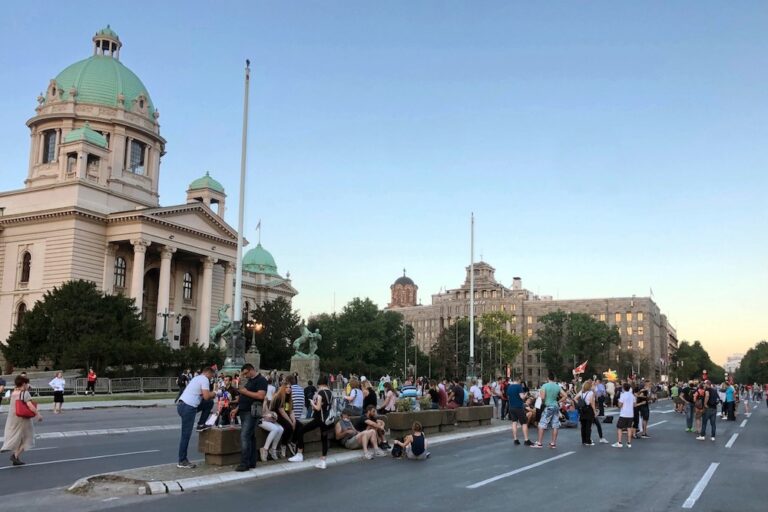(ARTICLE 19/IFEX) – The following is a 23 May 2002 ARTICLE 19 letter to members of the Montenegrin Parliament: Members of the Montenegrin Parliament C/o Ms. Vesna Perovic President of the Parliament Copied to the President of the Republic Dear Members of Parliament, ARTICLE 19, the Global Campaign for Free Expression, welcomes the proposed amendments […]
(ARTICLE 19/IFEX) – The following is a 23 May 2002 ARTICLE 19 letter to members of the Montenegrin Parliament:
Members of the Montenegrin Parliament
C/o Ms. Vesna Perovic
President of the Parliament
Copied to the President of the Republic
Dear Members of Parliament,
ARTICLE 19, the Global Campaign for Free Expression, welcomes the proposed amendments to the Montenegrin Penal Code, due to be discussed in the Montenegrin Parliament in the next few days. The amendments to Articles 82 and 84 of the Penal Code relating to defamation and insult enhance respect for freedom of expression and we urge the Parliament to vote in favour of their adoption. However, further amendments are needed in order to bring Montenegro’s law on defamation into line with international standards.
ARTICLE 19 welcomes the proposal to repeal paragraphs 1 and 2 of Article 82, abolishing the crime of public insult of the Parliament or Government, or the President of the Republic, the President of Parliament or the Prime Minister in connection with the performance of their official functions. We also welcome the proposal to repeal paragraph 3 of Article 84, removing the right of a public or military official to benefit from the assistance of the public prosecutor in bringing a criminal prosecution for defamation in connection with the performance of their official function. These amendments comply with the established international standard that public officials should never benefit from a higher level of protection of reputation than ordinary citizens.
However, even if these Articles are amended the Penal Code will still contain provisions which are in breach of international standards relating to freedom of expression and which should, therefore, also be amended or repealed.
Our recommendations for reform, set out below, are based on the ARTICLE 19 publication, Defining Defamation: Principles on Freedom of Expression and Protection of Reputation which has been endorsed by, among others, the UN Special Rapporteur on Freedom of Opinion and Expression and the OSCE Representative on Freedom of the Media. Similar recommendations have also been proposed by civil society organisations in Montenegro, including the Montenegrin Helsinki Committee. Widespread support for reform in Montenegro was demonstrated in May last year when 30 prominent intellectuals signed up to a regional charter calling for the decriminalisation of defamation.
First, pursuant to Article 82(1) of the Penal Code, it would remain a crime to defame the Republic of Montenegro, its flag, code of arms or national anthem.
Principle 2(b) of Defining Defamation states:
Defamation laws cannot be justified if their purpose or effect is to protect individuals against harm to a reputation which they do not have or do not merit, or to protect the “reputations” of entities other than those which have the right to sue and to be sued. In particular, defamation laws cannot be justified if their purpose or effect is to:
…
ii. protect the “reputation” of objects, such as State or religious symbols, flags or national insignia;
iii. protect the “reputation” of the State or national, as such
Second, the Penal Code still provides for imprisonment for defamation (see Article 76, which provides for up to three years imprisonment for defamation) and insult (see Article 77 which provides for up to six months for insult). Imprisoning individuals for defamation is in clear breach of international standards and yet these provisions have not been targeted for reform.
Principle 4(b)(iv) of Defining Defamation states:
Prison sentences, suspended prison sentences, suspension of the right to express oneself through any particular form of media, or to practise journalism or any other profession, excessive fines and other harsh penalties should never be available as a sanction for breach of defamation laws, no matter how egregious or blatant the defamatory statement.
Indeed, our Principles go even further, recommending that all criminal defamation laws be repealed and replaced, where necessary, with appropriate civil defamation laws. The criminalisation of a particular activity implies a clear State interest in controlling it and consequently international courts have stressed the need for governments to exercise restraint in applying criminal remedies when restricting fundamental rights, such as the right to freedom of expression. ARTICLE 19 therefore recommends repeal of all Penal Code provisions on defamation. However, in the interim, prison sentences and excessive fines should immediately be abolished and, consistent with established principles of criminal law, the burden of proof should rest fully on the party claiming to be defamed.
We welcome the proposed amendments as a first step towards bringing defamation law in Montenegro into line with international standards. At the same time, we urge members of the Montenegrin Parliament to take advantage of this opportunity to fully reform the defamation and insult laws, as recommended above.
Yours sincerely
Luitgard Hammerer
Head of Europe Programme


